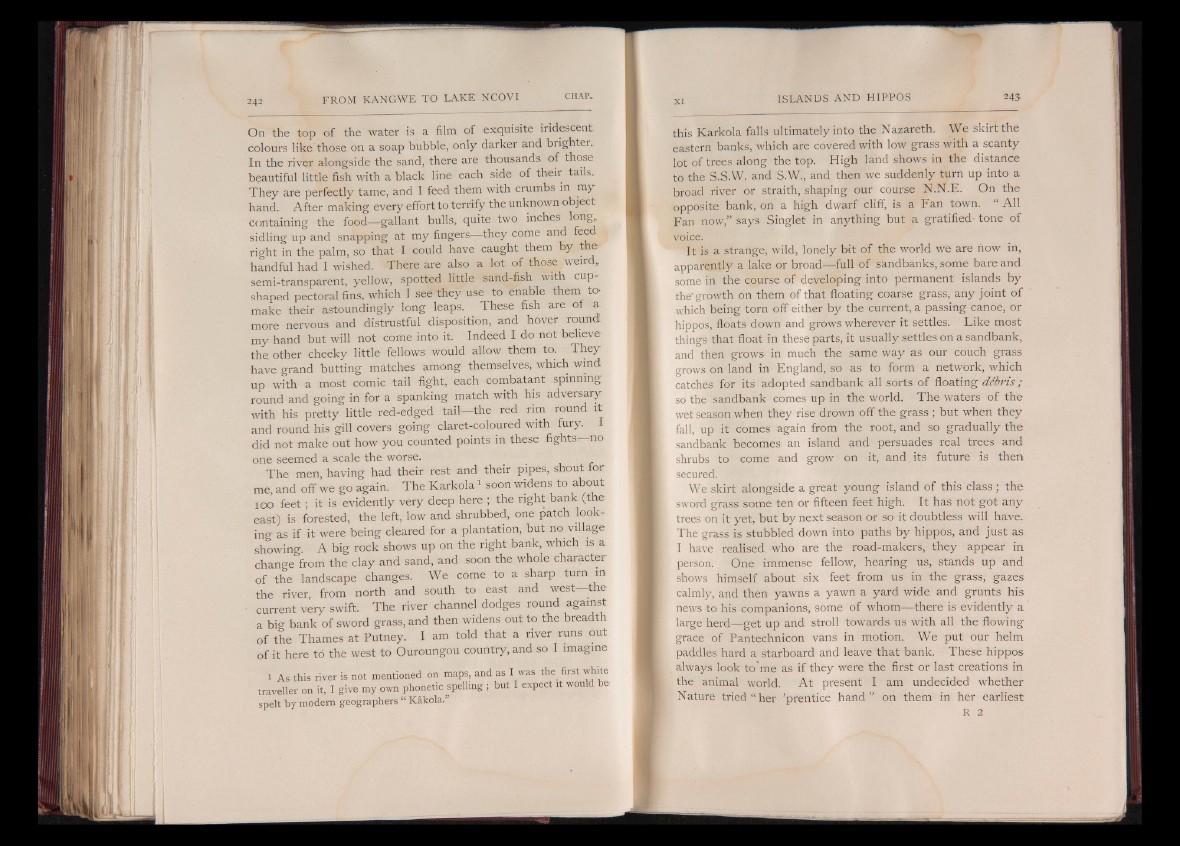
On the top of the water is a film of exquisite iridescent
colours like those on a soap bubble, only darker and brighter.
In the river alongside the sand, there are thousands of those
beautiful little fish with a black line each side of their tails.
They are perfectly tame, and I feed them with crumbs in my
hand. After making every effort to terrify the unknown object
containing the food— gallant bulls, quite two inches long,
sidling up and snapping at my fingers— they come and feed
right in the palm, so that I could have caught them by t &
handful had I wished. There are also a lot of those weird,
semi-transparent, yellow, spotted little sand-fish with cup
shaped pectoral fins, which I see they use to enable them to
make their astoundingly long leaps. These fish are of a
more nervous and distrustful disposition, and hover round
my hand but will not come into it. Indeed I do not believe
the. other cheeky little fellows would allow them to. They
have grand butting matches among themselves, which wind
up with a most comic tail fight, each combatant spinning,
round and going in for a spanking match with his adversary
with his pretty little red-edged tail— the red rim round it
and round his gill covers going claret-coloured with fury. I
did not make out how you counted points in these fights no
one seemed a scale the worse.
The men, having had their rest and their pipes, shout for
me, and off we go again. The Karkola j soon widens to about:
ioo fe e t ; it is evidently very deep here ; the right bank (the
east) is forested, the left, low and shrubbed, one patch looking
as if it were being cleared for a plantation, but no village
showing. A big rock shows up on the right bank, which is a
change from the clay and sand, and soon the whole character
of the landscape changes. We come to a sharp turn in
the river, from north and south to east and west— the
current very swift. The river channel dodges round against
a big bank of sword grass, and then widens out to the breadth
of the Thames at Putney. I am told that a river runs out
of it here to the west to Ouroungou country, and so I imagine
i As this river is not mentioned on maps, and as I was the first white
traveller on it, I give my own phonetic spelling ; but I expect it would be
spelt by modern geographers “ Kdkola.”
this Karkola falls ultimately into the Nazareth. We skirt the
eastern banks, which are covered with low grass with a scanty
lot of trees along the top. High land shows in the distance
to the S.S.W. and S.W., and then we suddenly turn up into a
broad river or straith, shaping our course N.N.E. On the
opposite bank, on a high dwarf cliff, is a Fan town. “ All
Fan now,” says Singlet in anything but a gratified tone of
voice.
It is a strange, wild, lonely bit of the world we are now in,
apparently a lake or broad— full of sandbanks, some bare and
some in the course of developing into permanent islands by
the'growth on them of that floating coarse grass, any joint of
which being torn off either by the current, a passing canoe, or
hippos, floats down and grows wherever it settles. Like most
things that float in these parts, it usually settles on a sandbank,
and then grows in much the same way as our couch grass
grows on land in England, so as to form a network, which
catches for its adopted sandbank all sorts of floating débris ;
so the sandbank comes up in the world. The waters of the
wet season when they rise drown off the grass ; but when they
fall, up it comes again from the root, and so gradually the
sandbank becomes an island and persuades real trees and
shrubs to come and grow on it, and its future is then
secured.
We skirt alongside a great young island of this class; the
sword grass some ten or fifteen feet high. It has not got any'
trees on it yet, but by next season or so it doubtless will have.
The grass is stubbled down into paths by hippos, and just as
I have realised, who are the road-makers, they appear in
person. One immense fellow, hearing us, stands up and
shows himself about six feet from us in the grass, gazes
calmly, and then yawns a yawn a yard wide and grunts his
news to his companions, some of whom— there is evidently a
large herd— get up and stroll towards us with all the flowing
grace of Pantechnicon vans in motion. We put our helm
paddles hard a starboard and leave that bank. These hippos
always look to'me as if they were the first or last creations in
the animal world. A t present I am undecided whether
Nature tried “ her ’prentice hand” on them in her earliest
R 2